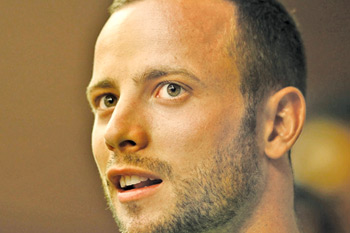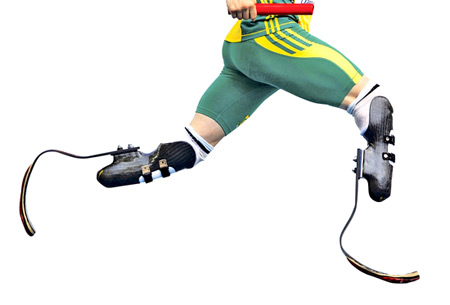
Never say Never
Aditha DISSANAYAKE
He stares at you with his blue-grey eyes. His smile is frank and
irresistible. Dressed in a white-jacket and trousers, with a pair of
sunglasses resting on his forehead, he looks no different to the other
athletes at the Olympics 2012. Yet, he is different. I know, because he
personally showed me the impossible is possible.
 With one simple email. As if to prove nothing in life is impossible,
when I tried to contact Oscar Pistorius for a quote from him to enrich
this article early this week, feeling in my heart of hearts my email
will be ignored, I was bolted out of the blue when he sent a reply. With one simple email. As if to prove nothing in life is impossible,
when I tried to contact Oscar Pistorius for a quote from him to enrich
this article early this week, feeling in my heart of hearts my email
will be ignored, I was bolted out of the blue when he sent a reply.
True to his nature, showing me he is indeed ‘different’ from most
celebrities in special ways other than the obvious, he sent the
following reply to my e message seeking his advice for disabled athletes
in developing countries like Sri Lanka who do not have the same
advantages he has.
“I’ve always been willing to work hard and make sacrifices to be the
best athlete I can possibly be” said Pistorius in his message given
exclusively to the Daily News. “I believe that you can achieve great
things if you are willing to work hard for what you want in life. I’m a
fierce competitor and determined to succeed.
My advice to athletes, in Sri Lanka whether they have a disability or
not, would be to challenge everything and learn from everything. You do
not need great facilities to become active, just a good heart and lot of
determination. Do not focus on your disability but make sure you educate
those around you at the same time. We should not be afraid of
disability. You are not disabled by the disability you have, you are
able by the ability you have. I live by this everyday by making the most
of my ability.”
Appreciating his resilience and determination in the face of
adversity, when he was introduced on his first appearance on the tracks
at the London Olympics, the roar with which the crowd greeted Pistorius,
rivaled the welcome given to the favorites - Michael Phelps and Usain
Bolt.
Newspaper reporters observed, though the South African was eliminated
from the 400m, finishing last in his semi-final, his presence was more
significant than his achievements on the track. As all the other
athletes embraced him after the event, Kirani James of Grenada, the
reigning world 400m champion had this to say of his fellow competitor.
‘Oscar is someone special, especially in our event. It’s a memorable
moment for me to be out here performing with him.” James added “I really
respect and admire the guy, I just see him as another athlete and
another competitor, and more importantly I see him as another person.”
This last statement is undoubtedly what Pistorius cherishes the most.
For, in spite of the labels the media has given him, focusing on his
“otherness”, calling him the Blade Runner and the “Fastest Man with no
Legs” all that Pistorius wants to be is - normal. Ask him how it feels
like to wear prosthetic legs, and listen to him give the (now) famous
answer, “When people ask me what it’s like having artificial legs, I
reply, ‘I don’t know. What’s it like having real legs?”
 |
|
Running
with different shoes:
Twenty Five year old Oscar Pistorius at the Olympics 2012 |
Unlike some amputees, like Hugh Herr, the director of the
Biomechatronics Group at the Massachusetts Institute of Technology, one
of Pistorius most vocal advocates, whose legs were amputated when he was
seventeen, Pistorius has never walked on biological legs. Twenty-five
years ago when he was born in Pretoria, South Africa, without a fibula
in either of his legs his parents had yielded to doctors’
recommendations that his lower legs should be amputated. At 11 months,
they were cut off just below the knee.
At 13 months, he was fitted with prostheses. At 17 months, he was
walking. And finally,at 25, he was running, running on the men’s 400
meters track, with able bodied athletes and placing second in the first
round of the event, at the Olympics 2012.
Being the second child in a family of three, when The Independent’s
Brian Viner asked Pistorius if he ever wished it had not happened, that
he had been born, like his brother and sister, with all limbs in full
working order he had this to say” “ It was never made an issue. My
mother would say to my brother, ‘you put on your shoes, and Oscar, you
put on your legs, then meet me at the car’. He adds “People’s perception
of me as a disabled kid changed when they saw the way I perceived
myself. I have always focused on my abilities, not my disabilities.”
A perception which dates back to his childhood. As Viner records in
his article in The Independent, on his first night in the hostel at
Pretoria Boys High, 13-year-old Pistorius had called together the other
23 boys in his dorm.
“ I’d been in long pants all day and they didn’t know. I said ‘I
don’t want you guys to get a fright when we get changed, but I don’t
have legs. I don’t want special treatment. I deal with my disability
with humour and I’d appreciate it if you could do the same’.”
Today, looking back at his 13 year old self he says “It was the worst
thing I could have said to those guys. They took the humour to a new
level. One night they hid my legs, then poured lighter fluid on my bed
frame and lit it. They woke me up and told me the building was burning
down, then they all ran out of the door. I couldn’t find my prosthetic
legs. I thought I was going to die. Then the guys came back, laughing.
It was a great practical joke.”
Though Pistorius laughs at this event in the past, one he will never
find himself laughing at, is the way the IAAF ruled in early 2008 that
the prosthetic limbs gave him an unfair advantage and would make him
ineligible in able-bodied competitions.
Undaunted by this ruling, determined to hold onto what he had fought
for all his life, to be treated like everyone else, he engaged lawyers
to contest the IAAF decision. In May 2008 it was duly overturned by the
Court of Arbitration for Sport, in light of detailed scientific evidence
that the blades conferred had no advantage.
 |
|
Always looking up:
“I live by making the most
of my ability.”
- Oscar Pistorius |
Yet, in spite of this ruling there are still those, who continue to
believe Pistorius’ blades give him an added bonus over able bodied
athletes. Pistorius argues his case, thus.“You have to look at the net
advantage or a net disadvantage. I’ve heard people saying I don’t have
lower limbs, therefore I’ve got less weight.
But there is also blood in those limbs, so I’ve got less blood. I
don’t have the tendons running from my foot to my ankles to my knee.”
Others point out how thousands of runners use the same prosthetic legs,
without getting anywhere near Pistorius’ times. Moreover, he has been
using the same blades since 2004 yet his times have steadily improved,
unequivocal proof that it is relentless training and improving technique
that have yielded progress, not fiendish advances in carbon-fibre
technology. His coach Ampie Louw, who has been training runners, both
able-bodied and disabled, for four decades says “People who believe
Oscar is at an advantage — are talking nonsense. They didn’t see all the
suffering, the battling for three months just to learn how to come off
starting blocks.”
Having only one pair of running legs it is said that Pistorius treats
them with great care, always taking them on planes as hand-luggage. With
his walking legs, though he is less careful. According to New York
Times’ Michael Sokolove, while riding his bike through tall grass
recently, Pistorius clipped a fence and turned around to see one of his
prosthetic legs swinging from a section of barbed wire. “An unwelcome
sight, for sure,” notes Sokolove, “but less dire than if it had been a
biological leg. It was one of the only times that it occurred to him
that having prosthetic lower limbs may confer some advantage.”
Yet, as Pistorius tells Sokolove, he gets no special thrill from
defeating men with two biological legs. To do so would be to dwell on
his own disability. “You have to move past it,” says Pistorius.
“Everyone has setbacks. I’m no different. I happen to have no legs.
That’s pretty much the fact.”
No wonder then, having created history as the first amputee to
compete in track with able bodied athletes at this year’s Olympics,
certain of winning and even possibly breaking records at the Paralympic
Games to be held in the weeks ahead, his mind is now on the 2016
Olympics in Rio. “I believe I’ll be at my peak in Rio. It’s already
beckoning me.”
He has to be. When he attaches his prosthetic limbs and steps to the
starting line for the 400-meter preliminary heats in Rio, as he did this
year in London, he will further destroy the preconceived notions of what
it means to be disabled.
Oscar Pistorius is living proof that the disabled do not just have to
tug at the world’s heartstrings; they can be heart-throbs. Specially if
they think the same as Pistorius, “I grew up not really thinking I had a
disability, I just grew up thinking I had different shoes.”
[email protected]
|





